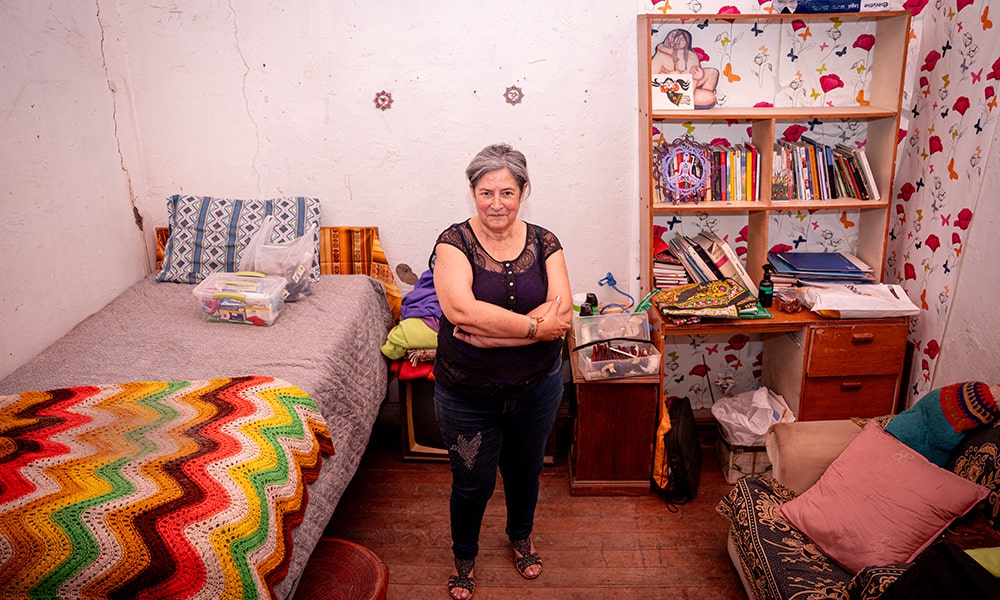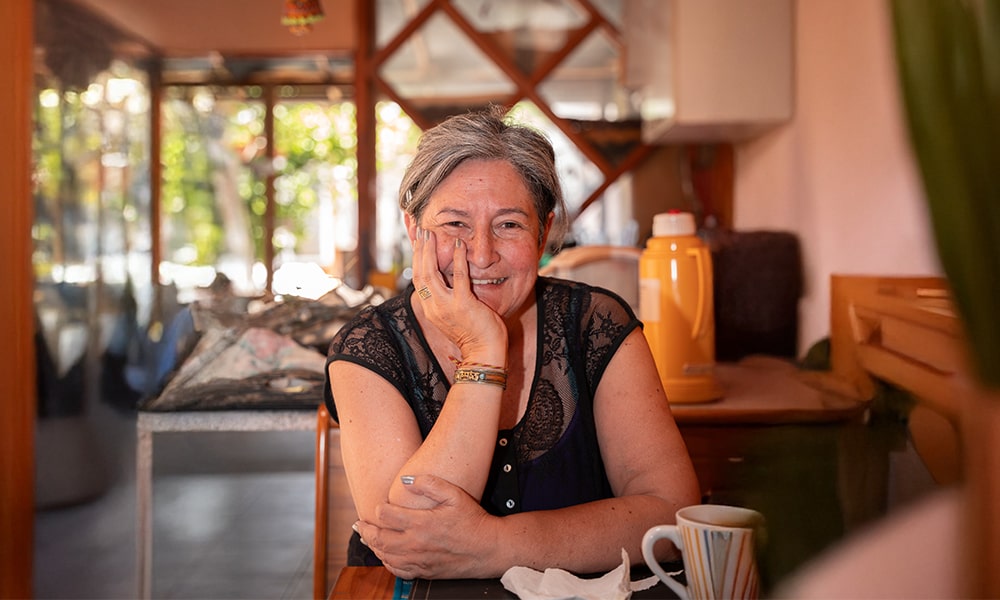Activism is Tatiana Venus Rojas Orellana’s birthright. Her grandfather was a union activist in mining, her mother, a skillful vendor, spoke out for human rights and raised Tatiana to be an activist. “She wouldn’t teach me how to cook or anything,” said Tatiana, with a engaging grin.
Beginning with her university student union during the Chilean dictatorship in the ‘70s, Tatiana went on to engage locally in Santiago, Chile, regionally and finally internationally, as a member of HomeNet International’s (HNI) founding executive committee. But her passion for gender inclusivity required more, so she championed the creation of HNI’s Gender Committee; she is now a committee member. Its first survey will be presented to UN Women, a champion for gender equality, in March 2025.
Tatania defies labels. She wears jewel-encrusted sandals, harboured childhood dreams of being a ballerina and is inclined to burst into song, but she also worked 30 years as an engineer and 20 as a powerful leader as a union leader and LGBTIQ+ activist. Tatania holds five main leadership positions: HNI’s Executive Committee member; President and Secretary of Luis Gauthier Union of Gay, Lesbian and Bisexual Workers; Treasurer of the National Textile Confederation (CONTEXIL); Director of the nationwide Movement for Sexual Diversity (MUMS); and Coordinator at the National Coordinator of Textile Workers in their Homes (CONATRADO).
She is used to confronting adversity. As a university student in 1979, she often demonstrated against the fascist dictatorship of Augusto Pinochet, and had to run into hiding at a nearby church. “They would see me coming, and then close the doors after me,” she said. Later, the university director expelled her, but her professors allowed her to continue her studies in engineering. “It was really beautiful to realize I was not alone.”

As we sit on the cool patio of the 120-year-old house she renovated, she talks about the importance of advocating for women in the informal economy, particularly LGBTIQ+ workers. Studies from MUMS and others indicate more than 50% experience discrimination at work, often leading them to prefer informal jobs or be entrepreneurs. The denial of the right to decent work is a form of violence, the studies conclude. “The future of their work is from home,” said Tatiana, 67.
The heart of much of her present activism concerns the need for gender inclusivity. HNI’s Gender Committee, launched in September 2023, is working to satisfy that need as a collective with 14 members from five regions. Including LGBTIQ+ on the agenda will be done slowly and respectfully, because this is not yet part of the culture in some regions.
But Tatiana smiles broadly as she describes the committee’s accomplishments so far: “It’s very happy.”
They drafted a code of conduct and glossary of terms, so they’d all be speaking the same language. In March 2024, they launched a survey of 405 home-based workers in five regions concerning their experiences and challenges, particularly those related to violence, both economic and physical. One unique aspect reflected in the survey is the acknowledgement that these women are not only workers, they are also caregivers, usually for family.
“The experience of working together on the survey really empowered us. We did it ourselves with no support… but it is really well done,” said Tatiana. It’s a vital document, because “when you make your demands, when you go to the ministry, for example, they always ask for statistics.”
She views the gender committee as providing the “tools so HNI can visualize the people in the informal economy and their precarious working conditions through the lens of gender.” These people include lesbians and transgender.
It’s a good thing that Tatiana retired seven years ago, or she’d never have time for all these activities. She does, however, have experience as a home-based worker. After years as an engineer, she realized 15 years ago that she wanted to invest more into being an activist. “I liked politics and I was good at it.” So, she quit her engineering job and re-trained as a therapist, providing Reiki, energy work and other health-based approaches from her home. As a professional with status in society, she didn’t face the same difficulties as her sister home-based workers, but like them, she is passionate about her work.
“I was paid a lot as an engineer, but now I’m even better off, even if I’m paid less,” said Tatiana, who has two sons, age 32 and 38.
Her activities seem endless. In 2021, she ran for city council with the Mayor Irací Luiza Hassler Jacob to raise awareness of LGBTIQ+ rights, She got a lot of votes, but didn’t enter office. “It was just enough to do it,” she said. “I don’t really want a public job.”
These days, she’s working with Mapuche Indigenous peoples who are widely discriminated against and seen only as potential domestic workers. “If you are born Mapuche or transgender, you will be discriminated against. You won’t have access to many things.”
These are wrongs that Tatiana has devoted her life to exposing and trying to mitigate.



